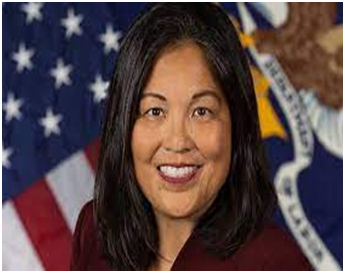
Last week, President Biden announced his intention to nominate Julie Su as Secretary of the U.S. Department of Labor, promoting her from her current position as Deputy. This nomination is significant for the employment community, as the head of the Labor Department has substantial influence over workplace policy. Assuming Su's confirmation, employers can expect a smooth transition from Secretary Marty Walsh and continued emphasis on worker-centered policy moves.
The U.S. Department of Labor (DOL) is a federal agency that affects employers nationwide. Its enforcement of laws involving employers and unions and the development of regulations and directives for workplace laws impact the American workplace daily. With over 30 specialized agencies, boards, offices, and programs, the DOL covers various labor and employment law topics, including family leave, joint employment, independent contractor classification, the gig economy, pay equity, and immigration law. Notably, three of the most well-known agencies and offices within the DOL are the Wage and Hour Division (WHD), the Occupational Safety and Health Administration (OSHA), and the Office of Federal Contract Compliance Programs (OFCCP).
Julie Su is an experienced professional in labor and employment law matters. Before her current role as Deputy Secretary of Labor, to which President Biden appointed her in 2021, she served as California's Labor Commissioner and head of the California Labor and Workforce Development Agency. She has also worked as a civil rights attorney and litigation director for Asian Americans Advancing Justice – Los Angeles. Su was born in Wisconsin to Chinese immigrants, speaks Mandarin and Spanish, and holds degrees from Stanford University and Harvard Law School.
Wage and Hour Law
The Department of Labor has been working on a new federal overtime rule, and with Secretary Su in charge, this is expected to continue. The proposed rule, which is still pending, would raise the exempt salary threshold under the Fair Labor Standards Act (FLSA). If confirmed, Su will likely try to increase the salary threshold from the current $684 a week to around $900-$1,000 a week. Employers should prepare for this impending change.
Changes to the DOL's independent contractor test are also expected. The misclassification of independent contractors is a significant risk for employers, and current employee-independent contractor models must fit the 21st-century workforce. As a proponent of AB5, a law that made it harder for employers in California to classify workers as independent contractors, Su may change the DOL's independent contractor test. The Biden administration has already shown a push to rescind flexible, separate contractor rules and return to an outdated standard that doesn't fit many roles in our gig-focused economy. The agency proposed a new law in October 2022, and a revised rule will be published soon, but the Walsh-Su transition might delay this process by a few months.
Under Secretary Su's leadership, the Department of Labor (DOL) is expected to focus on several areas in the coming months. Workplace safety is a top priority, and OSHA is set to release a COVID-specific rule for healthcare settings and a broader infectious disease regulation for all workplaces. To stay compliant, healthcare employers must take preventive measures and respond to outbreaks, while all employers must prioritize workplace safety.
Additionally, OSHA will likely increase workplace inspections under Su's leadership, and employers should be aware of the Severe Violator Enforcement Program (SVEP), which includes more workplaces. Compliance is critical since OSHA has raised penalties and allowed union leaders to accompany safety inspectors even in non-unionized environments. A six-step plan and part one of our "Focus 4" series can help employers prepare for potential inspections.
Another area of focus is joint employment, and the DOL is expected to issue a new rule in 2023 that holds multi-participant organizations accountable for wage and hour violations under federal law. Su's predecessor, Secretary Walsh, eliminated the Trump-era joint employer rule, and the DOL plans to replace it with a standard similar to the Obama administration's.
Su will also likely prioritize pay equity and transparency for women, low-wage earners, and underrepresented groups. She co-founded California's Pay Equity Task Force and may follow Walsh's lead in closing the pay gap at the national level. Employers can anticipate investigations into pay disparities, enforcement actions against federal contractors, and continued emphasis on diversity, equity, and inclusion by the Office of Federal Contract Compliance Programs (OFCCP). Finally, Su may advocate for the EEOC to reinstate the federal EEO-1 "Component 2" reports that required employers to report pay data and hours worked information to the government.



